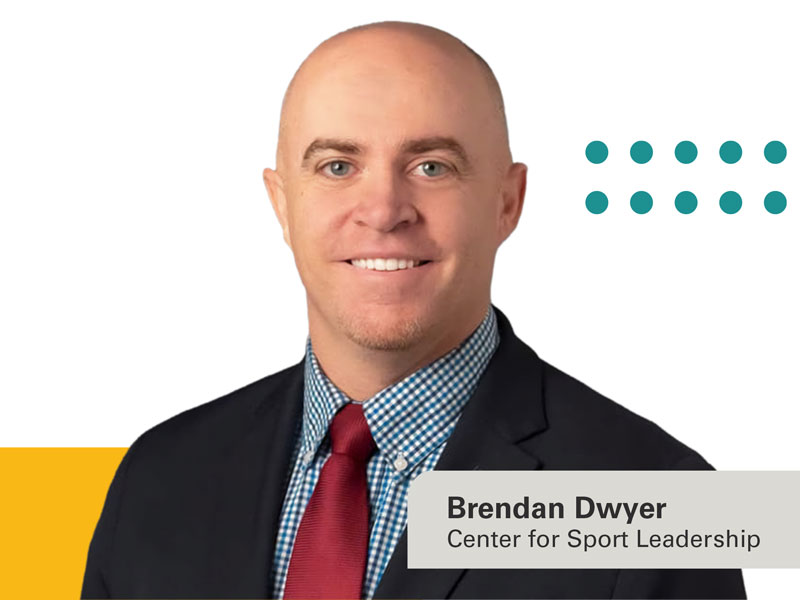Who’s Who at VCU Business: Brendan Dwyer

Author: Megan Nash
Ever thought about turning a passion into a career move? Meet Brendan Dwyer, Ph.D., director of Research and Distance Learning at the VCU Center for Sport Leadership. Imagine swapping the predictability of accounting to the unpredictability of sports – sounds exciting, right? Brendan made the leap, and it sparked a whole new chapter. Now, he’s merging his love for sports with economic insights and impactful teaching. Plus, he’s getting curious about sports betting. Let’s jump into Brendan’s world where he’s inspiring a new wave of leaders in the sports industry. Are you all in?
Let’s get started!
Where can we find you on the VCU map?
You can find me at the Sports Medicine Building at 1300 W. Broad.
Can you share a bit about your educational journey? Where did you go to school, and what was your major?
I earned my B.S. in Economics from Saint Cloud State University in Minnesota, my Master of Sports Studies from the University of Wisconsin-La Crosse and my Ph.D. in Sport and Exercise Science from the University of Northern Colorado.
What inspired you to pursue a career in your field, and how has your journey evolved over the years?
After several years as an accountant, I went back to school like many of our current sport leadership students to work in sports. I wanted to be a coach. While earning my master’s, I quickly realized that the college coaching lifestyle was not for me, so I changed course and sought to be a professor where I could ideally teach and coach at the same time.
So, what happened?
I have not coached at the college level since 2007. When I finished my Ph.D. in 2009, I interviewed at several schools, but the Center for Sport Leadership at VCU was head and shoulders above the rest. I also grew accustomed to doing research and enjoyed the process. At a Research 1 school with no college football, my options to coach were limited, but I thoroughly enjoyed my colleagues, the students and the work we were doing. The journey has certainly evolved. I only coach 8 and Under soccer these days, and where I once focused primarily on research, my energy has now spread to other areas within the Center. Teaching always remains a priority, but I spend more time managing new programs like our undergrad in Sport and Fitness Management.
Could you describe your current research or projects? What excites you most about them?
I am currently working on several sports betting projects with colleagues here at VCU and across the country. The sports betting industry has shocked the sports landscape since the federal deregulation in 2018, and it has altered how we currently watch sports.
I find it fascinating how people now behave. I am most excited about one study in which we are testing the knowledge distance between sports fans and sportsbooks. Obviously, sportsbooks know more, but is the distance in the mind of the consumer so great that fans are discouraged from participating, or do sports fans think they know more than they actually do? Either way, the industry will benefit from understanding more about this phenomenon.
It sounds like you’re placing some interesting bets on understanding fan psychology! It’s an interesting approach on observing shifts in perspectives. Speaking of shifts …
If you could time-travel to any historical period for a day, which era would you choose any why?
This is a tough one. I like history, so there are a number of time periods I would like to visit. However, if forced to choose one, I would choose the late 1770s to early 1780s in the U.S. It was the birth of a nation. Our country certainly has flaws, but the foresight and bravery these individuals had to craft a democracy that has mostly stood the test of time would be remarkable to witness. Some of the decisions also impacted future conflicts. The stakes were incredibly high. It would be remarkable to witness, especially since I know the result.
What’s the most unexpected or unconventional place where you’ve found inspiration for your academic work?
I have found sports fans are most irrational at sports bars. For football fans, I think it is due to the number of games on at one time. They are overstimulated and often over-beveraged. From sports betting to fantasy sports participation, I have developed several hypotheses from observing the interaction of fans with their teams and between other fans.
Categories News